Pigs are often associated with rolling in the mud rather than gracefully gliding through water. The question remains: can pigs swim? The idea of these plump animals paddling their way across a body of water may seem far-fetched, but the truth behind their aquatic abilities might surprise you.
While pigs are not known for their swimming prowess like dolphins or seals, they do possess some surprising swimming skills that have intrigued scientists and animal enthusiasts alike.
So let’s dive deeper into the fascinating world of whether pigs can truly swim or if it’s all just a playful splash in the mud!
Can Pigs Swim?
Pigs may not be the first animal that comes to mind when you think about swimming, but these creatures are surprisingly adept in water. With their strong bodies and natural buoyancy, pigs can paddle through the water effortlessly.
Swimming is not only good exercise for pigs but also provides mental stimulation and enrichment. It allows them to explore their surroundings differently and engage their minds in a new activity.
Swimming can help pigs cool off on hot days and alleviate any joint pain or stiffness they might be experiencing.
Do Pigs Enjoy Swimming?
Yes, Pigs are often underestimated for their swimming abilities, but in reality, they are quite adept swimmers. With a natural inclination towards water, pigs enjoy the sensation of floating and paddling around.
Swimming can also provide physical benefits for pigs by helping them stay cool in hot temperatures and providing exercise for their muscles.
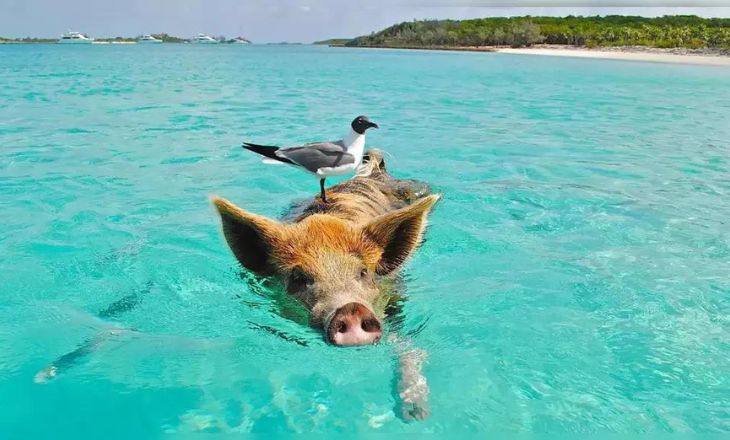
Swimming can have mental benefits for pigs as well. It offers them a stimulating and enriching experience that breaks the monotony of their daily routine. So next time you see a pig taking a dip, remember that they’re not just having fun – they’re also reaping physical and mental benefits from the experience.
How Do Pigs Swim?
Pigs are natural swimmers due to their buoyant bodies. This ability allows them to effortlessly float in water without much effort. In a fascinating experiment, pigs were observed swimming with ease, showcasing their innate swimming skills. Pigs use a doggy paddle motion to navigate through rivers, streams, lakes, and even swimming pools.
Apart from their aptitude for swimming, pigs also possess a playful attitude towards this activity. For these little animals, swimming is not just a survival skill but also an enjoyable pastime.
This revelation sheds light on the often underestimated intelligence and adaptability of pigs in various environments. Knowing that these farm animals can swim and take pleasure in it adds another layer of fascination to the already intriguing world of animal behavior.
The widely believed statement “pigs are mammals that can not swim” is just a myth
Contrary to the common belief that pigs are mammals that cannot swim, these creatures are indeed capable swimmers. Their instinct for swimming is ingrained from birth, and they often take to water bodies with ease. Pigs use swimming not only as a means of play but also to regulate their body temperature, especially during hot weather.
It’s fascinating to realize that while certain myths about animals persist, digging deeper into their behaviors can reveal a whole new world of understanding and appreciation for these intelligent creatures.
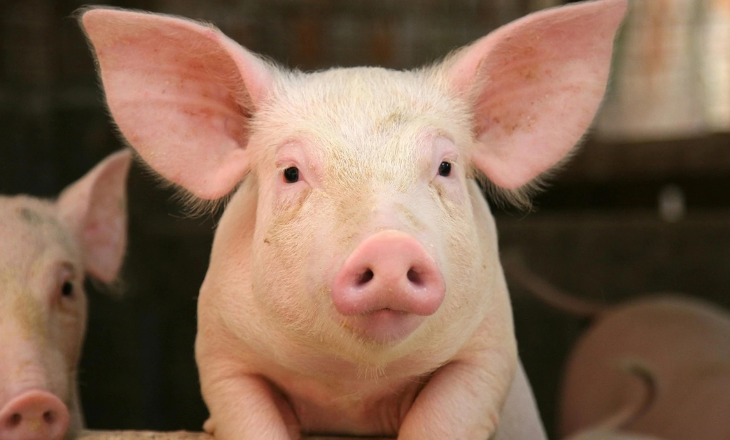
Debunking the myth surrounding pigs’ inability to swim sheds light on yet another captivating aspect of their biology and behavior. It serves as a reminder not to rely solely on popular beliefs but to seek out factual information when exploring the wonders of the animal kingdom.
Pigs do not need to be trained, they naturally know how to swim
Pigs are inherently skilled swimmers, unlike other animals such as gorillas, chimpanzees, monkeys, apes, and dogs requiring training or water exposure before swimming. This natural ability makes pigs stand out as they do not need any special training when it comes to swimming.
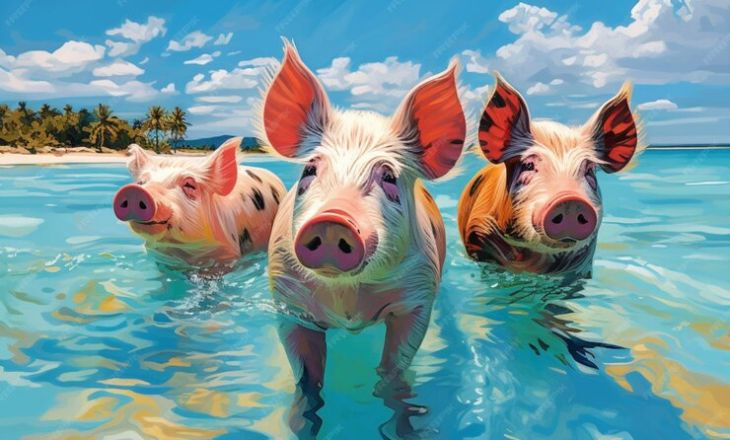
If you have pigs on your farm, you can rest assured that they will instinctively know how to navigate the water without any intensive instruction. Their innate swimming prowess sets them apart not just for their proficiency in the water but also for their independence from formal training.
Pigs have been swimming since the beginning of time for various reasons
Throughout history, pigs have been known to take a dip in the water for a multitude of reasons. While pet pigs may enjoy a swim once or twice weekly, their wild counterparts are more accustomed to daily swims.
Whether evading predators, seeking optimal breeding grounds, or finding food sources, wild pigs utilize swimming as a survival tactic. Regulating body temperature is another key benefit that draws wild pigs to the water.
They can swim alone and with humans | Can Pigs Swim?
Pigs are proficient swimmers and can swim independently or with humans. Unlike horses, pigs do not require training to swim and cannot be ridden in water.
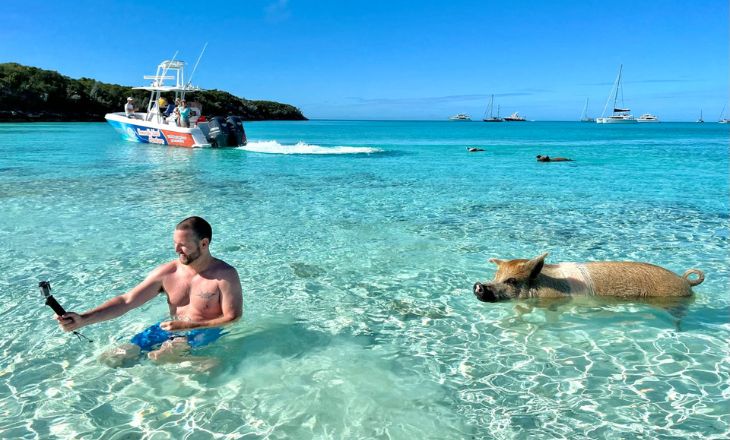
Their natural swimming abilities make it safe for them to swim alone, but they are also comfortable with a human companion if desired by the keeper.
They swim better in rivers, streams, lakes, and swimming pools
Pigs have a unique ability to adapt to various aquatic environments, showcasing their versatility and resilience in different water bodies. From navigating the currents of rivers to exploring the calm waters of lakes, these animals demonstrate their natural swimming prowess effortlessly.
It is fascinating to witness how pigs effortlessly glide through the waters, utilizing their strong bodies and agile movements to propel themselves smoothly. While some may be surprised by this hidden talent of pigs, it serves as a testament to the diverse capabilities of these intelligent creatures.
Whether frolicking in the gentle waves of a swimming pool or gracefully diving into a stream, pigs exhibit a sense of joy and freedom in their aquatic endeavors that is truly captivating.
Pigs love water more, even more than mud
Pigs have a strong affinity for water, sometimes even more so than mud. While they enjoy wallowing in mud for various reasons such as cooling off and removing parasites like ticks and lice, they also have a fondness for fresh water. In fact, given the choice, pigs would opt for water over mud.
Even the overly pampered pet pigs know how to swim
Pigs, despite their reputation as farm animals or household pets, possess an innate ability to swim that often surprises many. This skill is not just reserved for wild pigs surviving in harsh environments; even the most pampered pet pigs can effortlessly navigate through water.
Observing a pig confidently gliding across a body of water with ease serves as a testament to the remarkable aquatic instincts ingrained within these creatures.
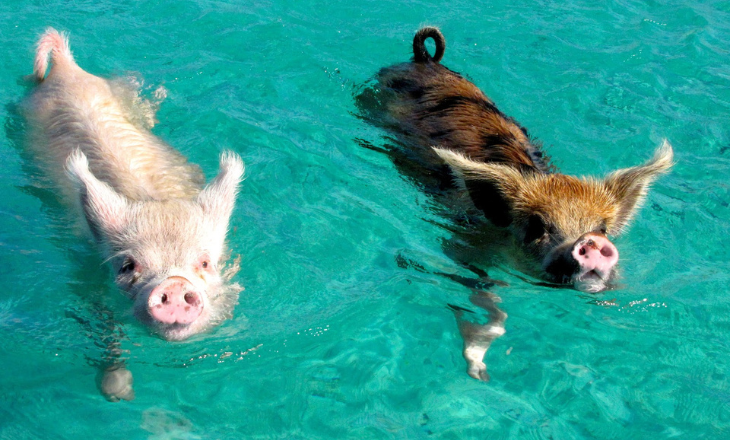
It’s fascinating to witness how these seemingly land-dwelling animals can swiftly adapt to swimming without any prior exposure or training. The ability to swim comes naturally to pigs, showcasing their unique blend of intelligence and instinctive behavior.
The wild pigs are better swimmers than the domestic ones
Wild pigs are true aquatic athletes, mastering the art of swimming through daily practice and necessity. Their robust muscles and streamlined bodies allow them to glide effortlessly through the water, utilizing their skills for survival in challenging environments.
Domestic pigs, pampered and sheltered, lack the opportunity to develop their swimming abilities. This stark contrast in conditioning is what ultimately sets wild pigs apart as superior swimmers.
The physical prowess of wild pigs in water showcases their resilience and adaptability in diverse terrains. With each stroke and kick, they navigate rivers and lakes with grace and agility, showcasing a spectacle of natural ability.
This innate talent not only aids in their hunt for food but also serves as a means of escape from predators. Domestic pigs may struggle to keep up when met with similar aquatic challenges due to their limited exposure to such demanding conditions.
Swimming is super beneficial for domestic animals like pigs
Swimming is not only a beneficial physical activity for domestic animals like pigs but also serves as a unique form of exercise that promotes overall wellness. The act of swimming aids in regulating body temperature, especially crucial for pigs that lack sufficient sweat glands.
By engaging in regular swimming sessions or spending time in mud baths, pigs can efficiently cool down and maintain their body temperature within a healthy range. This gentle yet effective way of cooling off not only keeps the animals comfortable but also supports their physiological well-being.
The low-impact nature of swimming reduces the risk of strain or injury compared to other forms of exercise. Incorporating swimming into the routine care and enrichment activities for domestic pigs can contribute significantly to their physical health and vitality.
Swimming with pigs is not recommended for humans
It is advised against humans swimming with pigs due to the potential health risks involved. While some may feel comfortable swimming with their pets, it is important to note that pigs can carry various harmful diseases.
Engaging in water activities with pigs could increase the risk of contracting these illnesses.
Conclusion
Pigs are surprisingly adept swimmers and possess a natural ability to navigate through water with ease. Their buoyant bodies and strong legs enable them to paddle efficiently, making swimming a popular activity for many pig breeds.
Despite their reputation for being land animals, pigs can swim quite well and enjoy the water. Understanding these facts about pigs swimming sheds light on their abilities and behaviors in aquatic environments.
Next time you come across a pig near water, observe its swimming abilities with a newfound appreciation for their versatility in different environments.
FAQs
Why Do Pigs Like Fresh Clean Water?
Pigs are known to enjoy fresh, clean water for a variety of reasons. One significant factor is that pigs do not have many sweat glands, making it challenging for them to regulate their body temperature in hot weather. By immersing themselves in cool water, pigs can effectively lower their body temperature and avoid overheating.
Can Domestic Pigs Swim Well?
Domestic pigs are quite adept swimmers, despite their reputation for being land animals. Wild pigs, such as the wild boar, are known for their excellent swimming abilities, which they use for foraging and escaping predators. Domestic pigs inherit some of these natural swimming instincts and can navigate through water with surprising ease.
Are There Any Foods Toxic To Pigs?
Yes, certain foods can be toxic to pigs and should be avoided. Canned fruits or vegetables should not be fed to pigs as they often contain high levels of salt which can be harmful to their health. While designed for rapid growth, commercial hog foods may not always provide the necessary nutrients for a pig’s overall well-being.
- Can Cows Eat Oranges? Precautions and Benefits - May 27, 2024
- Can Rabbits Eat Rosemary? CareTips, Risks and Benefits - May 23, 2024
- Can Pekin Ducks Fly? Interesting Facts about Flight - May 19, 2024

